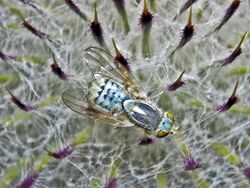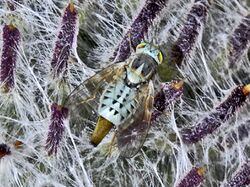Biology:Terellia serratulae
| Terellia serratulae | |
|---|---|

| |
| Terellia serratulae. Male on a Cirsium flowerhead | |

| |
| Terellia serratulae. Female with ovipositor | |
| Scientific classification | |
| Domain: | Eukaryota |
| Kingdom: | Animalia |
| Phylum: | Arthropoda |
| Class: | Insecta |
| Order: | Diptera |
| Family: | Tephritidae |
| Subfamily: | Tephritinae |
| Tribe: | Terelliini |
| Genus: | Terellia |
| Species: | T. serratulae
|
| Binomial name | |
| Terellia serratulae | |
| Synonyms | |
Terellia serratulae is a species of tephritid or fruit flies in the family Tephritidae.[5]
Description
Terellia serratulae can reach a length of about 4–6 millimetres (0.16–0.24 in). This bluish clear-winged fruit fly has a hairy abdomen with a chequered black pattern. The apex of the antennae is reddish or yellow-orange. In the females the length of the ovipositor corresponds approximately to the length of the last three abdominal segments (tergites).[6][7]
The females deposit eggs into the opened thistle flowerheads. The young larvae start feeding on the achenes of thistles (mainly Cirsium and Carduus species), but they do not induce gall-forming. They develop in the flower-heads (capitulum) of thistles in a cocoon of silk and plant hairs (pappus). This univoltine species overwinters in the larval stage. Adults are on the wing from July to September.[8]
Distribution and habitat
This species can be found around thistles in most of Europe, in the eastern Palearctic realm, in the Near East, and in North Africa.[9]
References
- ↑ Loew, H. (1844). "Kritische Untersuchung der europäische n Arten des Genus Trypeta Meig.". Z. Ent. (Germar) 5: 312–437.
- ↑ 2.0 2.1 Robineau-Desvoidy, André Jean Baptiste (1830). "Essai sur les myodaires". Mémoires presentés à l'Institut des Sciences, Lettres et Arts, par divers savants et lus dans ses assemblées: Sciences, Mathématiques et Physique 2 (2): 1–813. https://www.biodiversitylibrary.org/page/3472165#page/9/mode/1up. Retrieved 15 July 2018.
- ↑ Wiedemann, Christian Rudolph Wilhelm (1824). Munus rectoris in Academia Christiana Albertina aditurus Analecta entomologica ex Museo Regio Havniens: maxime congesta profert iconibusque illustrat. Kiliae,eregio typoguapheo scholarum. pp. 1–60. https://www.biodiversitylibrary.org/item/148003#page/5/mode/1up. Retrieved 11 May 2020.
- ↑ Manuel, B.E. (1811). Mouche. [Concl.] Pp. 1-45. In Olivier, G. A., Histoire Naturelle des Insectes, Volume 8, Mou-Pao. 722 pp. In Societe de Gens de Lettres, de Savants et d'Artistes, Encyclopedie Methodique.. Paris: Agasse.
- ↑ Norrbom, A.L.; Carroll, L.E.; Thompson, F.C.; White, I.M; Freidberg, A. (1999). "Systematic Database of Names. Pp. 65-252. In Thompson, F. C. (ed.), Fruit Fly Expert Identification System and Systematic Information Database.". Myia 9: vii + 524.
- ↑ Nature Spot
- ↑ Insecten Box
- ↑ H Michaelis Competition of Urophora Stylata F. and Terellia Serratulae L. (Dipt., Tephritidae) in the Flowerheads of Cirsium Vulgare
- ↑ Fauna Europaea
External links
Wikidata ☰ Q14405979 entry
 |

